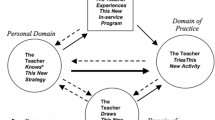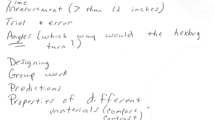Abstract
The CASCADE-SEA program aims to support curriculum development within the context of secondary level science and mathematics education in sub-Saharan Africa. This project focuses on the iterative design of a computer-based curriculum development support system for the creation of classroom materials. Through this process, developers hope to gain a better understanding of curriculum development within this context, in addition to creating a product that is valid, practical and effective. The CASCADE-SEA endeavor is rooted in the notion that teacher development and curriculum development occur simultaneously, even synergistically. Thus, the prototy** process takes place through inter-related study of teacher professional development and curriculum development in the arenas of mathematics and science education in southern Africa. This chapter discusses the origins of CASCADE-SEA as well as the first three episodes of its prototy** process.
Access this chapter
Tax calculation will be finalised at checkout
Purchases are for personal use only
Preview
Unable to display preview. Download preview PDF.
Similar content being viewed by others
References
Ball, D. and Cohen, D., 1996, Reform by the book: what is — or might be — the role of curriculum materials in teacher learning and instructional reform—, Educational Researcher (25)9, 6–8, 14.
Ben-Peretz, M., 1990, The teacher-curriculum encounter, State University of New York Press, Albany, NY.
Caillods F., Göttelmann-Duret, G. and Lewin, K., 1996, Science education and development: Planning and policy issues at secondary level, Pergamon, Paris.
Feiter, L. de, Vonk, H. and Akker, J. Van den, 1995, Towards more effective science teacher development in southern Africa, VU University Press, Amsterdam.
Gery, G., 1991, Electronic performance support systems: How and why to remake the workplace through strategic application of technology, Weingarten, Boston.
Goodlad J., Klein, M. and Tye, K., 1979, The domains of curriculum and their study, In Goodlad, J. and Associates (Eds.), Curriculum inquiry: The study of curriculum practice, 43–76, McGraw-Hill, New York.
Guthrie, G., 1986, Current research in develo** countries: the impact of curriculum reform on teaching. Teaching and Teacher Education, 2, 81–89.
London, N., 1993, Why education projects in develo** countries fail: a case study. International Journal of Educational Development, 13, 265–275.
McKenney, S., 1995, The formative evaluation of a Namibian physical science teacher guide, Master’s thesis, University of Twente, Enschede.
Nieveen, N. and Akker, J. Van den, 1996, Computer supported curriculum development, In Plomp, Tj. and Ely, D. (Eds.), International encyclopedia of educational technology, 153–158, Pergamon, Oxford.
Nieveen, N., 1997, Computer support for curriculum developers, Doctoral dissertation, University of Twente, Enschede.
Ottevanger, W. and & Akker, J. Van den, 1996, Supporting curriculum changes in Namibian classrooms, Paper presented at the AERA annual meeting, April 8–12, New York.
Snyder J., Bolin, F. and Zumwalt, K., 1992, Curriculum implementation, In Jackson, P. (Ed.), Handbook of research on curriculum, 402–435, Macmillan, New York.
Stevens, G. and Stevens, E., 1995, Designing electronic performance support tools: improving workplace performance with hypertext, hypermedia and multimedia, Engelwood Cliffs, NJ, Educational Technology Publications.
Verspoor, A., 1989, Using textbooks to improve the quality of education, In Farrell, J.P. and Heyneman, S.P. (Eds.), Textbooks in the develo** world: Economic and educational choices, 52–60, World Bank. Washington, DC.
Verspoor, A., 1992, Planning of education: Where do we go— International Journal of Educational Development, 12, 233–244.
Ware, S., (1992), Secondary school science in develo** countries. PHREE background paper series, World Bank, Washington, DC.
Author information
Authors and Affiliations
Editor information
Editors and Affiliations
Rights and permissions
Copyright information
© 1999 Springer Science+Business Media Dordrecht
About this chapter
Cite this chapter
McKenney, S. (1999). CASCADE — SEA: Computer Assisted Curriculum Analysis, Design & Evaluation for Science Education in Africa. In: van den Akker, J., Branch, R.M., Gustafson, K., Nieveen, N., Plomp, T. (eds) Design Approaches and Tools in Education and Training. Springer, Dordrecht. https://doi.org/10.1007/978-94-011-4255-7_19
Download citation
DOI: https://doi.org/10.1007/978-94-011-4255-7_19
Publisher Name: Springer, Dordrecht
Print ISBN: 978-94-010-5845-2
Online ISBN: 978-94-011-4255-7
eBook Packages: Springer Book Archive




